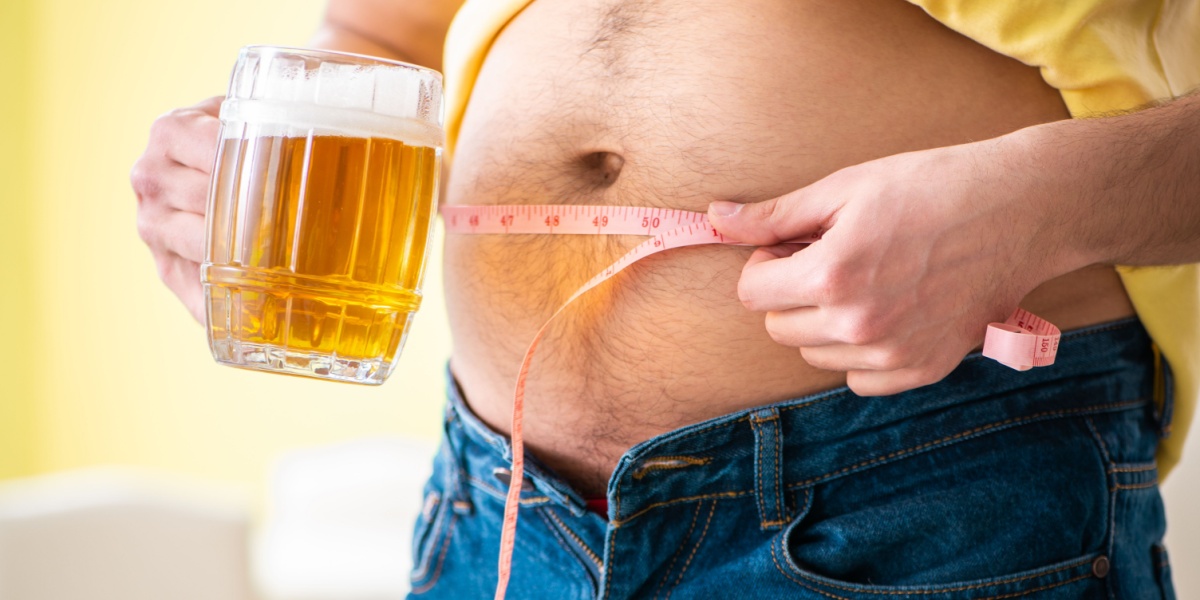Alcohol can lead to multiple effects on the body, including bloating, which can be caused by weight gain, carbonated drinks, or stomach inflammation. While bloating is often temporary and can be resolved with home or over-the-counter remedies, it may also be a sign of something more serious that may require professional help.
- Drinking alcohol can cause bloating and puffiness in the stomach and face, which can be caused by various factors.
- Reducing alcohol consumption, adopting healthy lifestyle habits, eating nutritious foods, and staying hydrated can all help reduce bloating.
- Bloating can be a sign of or lead to serious health problems, such as ulcers and blockages, which may require medical attention.

Identifying alcohol bloating
People who regularly drink alcohol or consume large quantities in one sitting are likely to experience bloating, weight gain (or a ‘beer belly’), puffiness in the face, or stomach issues. Various factors can contribute to alcohol-induced bloating, and it can feel uncomfortable or painful.[1][2]
Often, bloating is temporary and will go away if alcohol consumption is reduced or other steps are taken to manage symptoms. However, bloating can be related to serious or chronic issues, which may become more severe if left untreated.[3]
Causes of alcohol-induced bloating
Causes of alcohol-induced bloating can include:[1][4][5][6]
- Dehydration: Alcohol is a diuretic, which means that it causes increased fluid elimination. This can cause dehydration, leading to changes in digestive health, weight changes, and issues with bowel movements, all of which can contribute to feeling bloated. Additionally, the stomach retains water when the body is dehydrated, pulling fluid from other tissues into the stomach, adding to bloating.
- Gastritis: Toxins in alcohol can irritate the intestinal tract and cause the stomach lining to become inflamed. This can cause bloating, pain, and discomfort in the stomach.
- Gassy drinks: Carbonated drinks, such as beers and drinks used as mixers, contain carbon dioxide, which causes bloating when the gas enters the stomach. Beers also contain gluten and yeast, which can add to feeling full and bloated.
- Calories: Alcoholic drinks are often high in sugar content and calories, which can lead to weight gain and bloating.
- Ascites: Chronic alcohol consumption can cause liver damage, such as cirrhosis, leading to ascites. Ascites is the accumulation of fluid in the abdominal cavity due to impaired liver function. This condition causes significant abdominal swelling, a sense of heaviness, and discomfort. It is a severe complication that may also lead to shortness of breath and other systemic issues if untreated
Prevention strategies
The best way to prevent alcohol bloating is to stop drinking alcohol. People may wish to seek professional advice to help them stop drinking alcohol, particularly if it feels daunting or challenging. In the meantime, reducing alcohol consumption can help to prevent bloating. Additionally, it can help to change the type of alcoholic beverage to something lower in calories or less gassy.
Other ways to prevent alcohol bloating include: [7]
- Making sure to stay hydrated throughout the day and while drinking alcohol by drinking plenty of water.
- Avoiding foods that cause bloating, such as highly processed or fatty foods, particularly during or after drinking.
- Avoiding or reducing smoking while drinking.
Remedies for alcohol bloating
Various remedies are available to help reduce alcohol bloating, including medications for immediate relief and changes to lifestyle habits.
Immediate relief
Lifestyle adjustments
Certain lifestyle changes can help to reduce alcohol bloating, including: [4][7][8]
- Regularly drinking plenty of water to stay hydrated.
- Consuming plenty of fruit, vegetables, and healthy beverages. These foods and drinks provide nutrients and electrolytes that are lost when consuming alcohol and can help improve physical well-being and digestive health.
- Engaging in regular exercise can support healthy digestion and prevent bloating and weight gain.
- Improving sleep quality and regularity by maintaining a consistent sleep schedule.
- Cutting down or quitting smoking cigarettes.
- Seeking professional support to quit drinking.
When to seek medical attention
In most cases, alcohol-induced bloating can be managed without the need for professional help. However, there may be instances in which it is a sign of a serious health condition, so it can be helpful to know what to look out for and when medical advice is required.
Red flags to watch out for
Possible medical conditions
Prolonged and excessive alcohol consumption can lead to chronic bloating and can increase the risk of severe health conditions including: [2][3]
- Irritable bowel syndrome (IBS)
- Delayed stomach emptying
- Blocked bowels
- Stomach ulcers
- Stomach tumors
Alcohol can also cause an increased risk of other health conditions, including: [1][3]
- Liver, heart, or kidney disease
- Weakened immune system
- Increased risk of cancer
- Mental health issues
- Alcohol use disorder



-guide-detail.jpg?v=1722502019)
-(1)-guide-detail.jpg?v=1722503034)